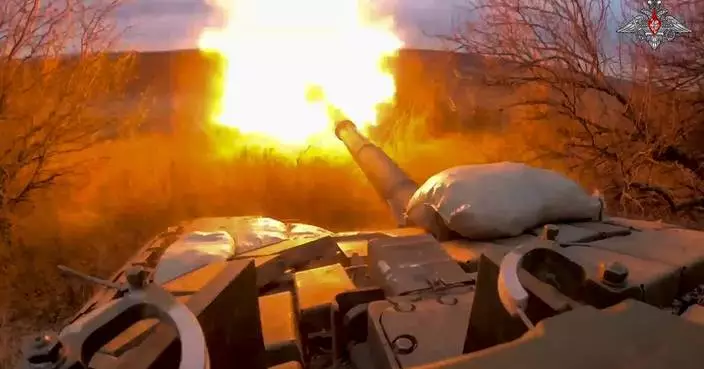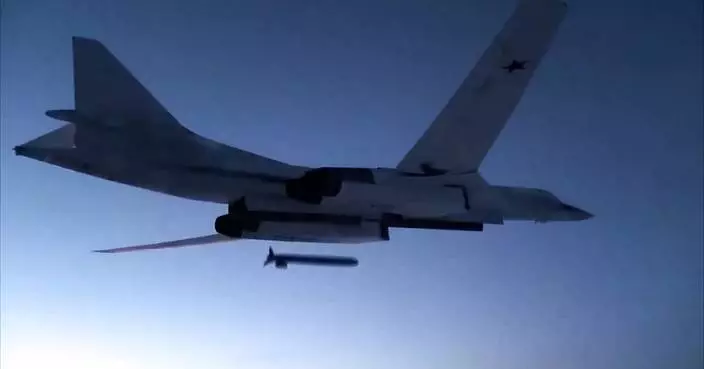Amid global fears of an escalating trade dispute between the U.S. and China, President Donald Trump suggested that Beijing will ease trade barriers "because it is the right thing to do" and that the economic superpowers can settle the conflict that has rattled financial markets, consumers and businesses.
But fostering more uncertainty, the president's top economic advisers offered mixed messages Sunday as to the best approach with China, which has threatened to retaliate if Washington follows through with its proposed tariffs, even as Trump emphasized his bond with Chinese President Xi Jinping.
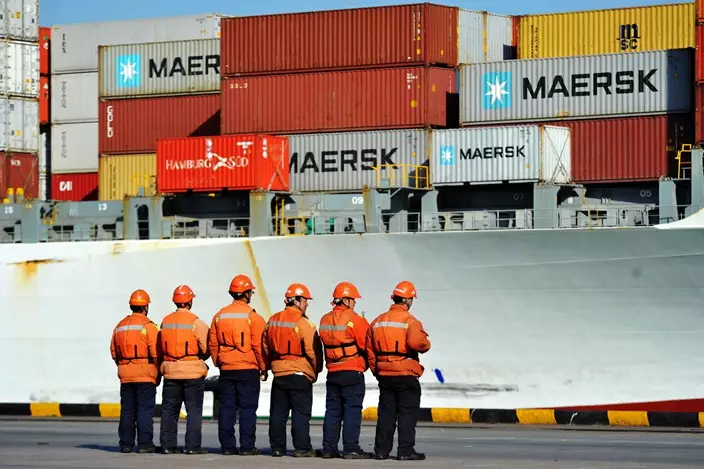
Chinese workers stand in front of a loaded cargo ship docked at a port in Qingdao in east China's Shandong province, Sunday, April 8, 2018. (Chinatopix via AP)
"President Xi and I will always be friends, no matter what happens with our dispute on trade," Trump wrote. "China will take down its Trade Barriers because it is the right thing to do. Taxes will become Reciprocal & a deal will be made on Intellectual Property. Great future for both countries!"
But Trump did not explain why, amid a week of economic saber-rattling between the two countries that shook global markets, he felt confident a deal could be made.
The president made fixing the trade imbalance with China a centerpiece of his presidential campaign, where he frequently used incendiary language to describe how Beijing would "rape" the U.S. economically. But even as Trump cozied up to Xi and pressed China for help with derailing North Korea's nuclear ambitions, he has ratcheted up the economic pressure and threatened tariffs, a move opposed by many fellow Republicans.
The Trump administration has said it is taking action as a crackdown on China's theft of U.S. intellectual property. The U.S. bought more than $500 billion in goods from China last year and now is planning or considering penalties on some $150 billion of those imports. The U.S. sold about $130 billion in goods to China in 2017 and faces a potentially devastating hit to its market there if China responds in kind.
China has pledged to "counterattack with great strength" if Trump decides to follow through on his latest threat to impose tariffs on an additional $100 billion in Chinese goods — after an earlier announcement that targeted $50 billion. Beijing also declared that the current rhetoric made negotiations impossible, even as the White House suggested that the tariff talk was a way to spur China to the bargaining table.
The new White House economic adviser, Larry Kudlow, said Sunday that a "coalition of the willing" — including Canada, much of Europe and Australia — was being formed to pressure China and that the U.S. would demand that the World Trade Organization, an arbiter of trade disputes, be stricter on Beijing. And he said that although the U.S. hoped to avoid taking action, Trump "was not bluffing."
"This is a problem caused by China, not a problem caused by President Trump," Kudlow said on "Fox News Sunday."
But he also downplayed the tariff threat as "part of the process," suggested on CNN that the impact would be "benign" and said he was hopeful that China would enter negotiations. Kudlow, who started his job a week ago after his predecessor, Gary Cohn, quit over the tariff plan, brushed aside the possibility of economic repercussions.
"I don't think there's any trade war in sight," Kudlow told Fox.
Treasury Secretary Steve Mnuchin said on CBS' "Face the Nation" that he didn't expect the tariffs to have a "meaningful impact on the economy" even as he left the door open for disruption. He allowed that there "could be" a trade war but said he didn't anticipate one.
Another top White House economic adviser, Peter Navarro, took a tougher tack, declaring that China's behavior was "a wakeup call to Americans."
"They are in competition with us over economic prosperity and national defense," Navarro said on NBC's "Meet the Press." ''Every day of the week China comes into our homes, our business and our government agencies. ... This country is losing its strength even as China has grown its economy."
Trump's latest proposal intensified what was already shaping up to be the biggest trade battle in more than a half century.
Trump told advisers last week that he was unhappy with China's decision to tax $50 billion in American products, including soybeans and small aircraft, in response to a U.S. move to impose tariffs on $50 billion in Chinese goods. Rather than waiting weeks for the U.S. tariffs to be implemented, Trump backed a plan by Robert Lighthizer, his trade representative, to seek the enhanced tariffs.
The rising economic tensions pose a test to what has become Trump's frequent dual-track foreign policy strategy: to establish close personal ties with another head of state even as his administration takes a harder line. The president has long talked up his friendship with Xi, whom he has praised for consolidating power in China despite its limits on democratic reforms.
Further escalation could be in the offing. The U.S. Treasury Department is working on plans to restrict Chinese technology investments in the U.S. And there is talk that the U.S. could also put limits on visas for Chinese who want to visit or study in this country.
For Trump, the dispute runs the risk of blunting the economic benefits of his tax overhaul, which is at the center of congressional Republicans' case for voters to keep them in power in the 2018 elections. China's retaliation so far has targeted Midwest farmers, many of whom were bedrock Trump supporters.
JERUSALEM (AP) — A Palestinian security official and an Egyptian official say Israeli tanks entered the southern Gaza town of Rafah, reaching as close as 200 meters (yards) from its crossing with neighboring Egypt.
The Egyptian official said the operation appeared to be limited in scope. He and Hamas’ Al-Aqsa TV said Israeli officials informed the Egyptians that the troops would withdraw after completing the operation.
The Israeli military declined to comment. On Sunday, Hamas fighters near the Rafah crossing fired mortars into southern Israel, killing four Israeli soldiers.
The Egyptian official, located on the Egyptian side of Rafah, and the Palestinian security official spoke on condition of anonymity because they were not authorized to talk to the press.
The Associated Press could not independently verify the scope of the operation.
Earlier Monday, Israel’s War Cabinet decided to push ahead with a military operation in Rafah, after Hamas announced its acceptance of an Egyptian-Qatari proposal for a cease-fire deal. The Israeli military said it was conducting “targeted strikes” against Hamas in Rafah without providing details.
THIS IS A BREAKING NEWS UPDATE. AP’s earlier story follows below.
Hamas announced its acceptance Monday of an Egyptian-Qatari cease-fire proposal, but Israel said the deal did not meet its “core demands” and that it was pushing ahead with an assault on the southern Gaza town of Rafah. Still, Israel said it would continue negotiations.
The high-stakes diplomatic moves and military brinkmanship left a glimmer of hope alive — but only barely — for an accord that could bring at least a pause in the 7-month-old war that has devastated the Gaza Strip. Hanging over the wrangling was the threat of an all-out Israeli assault on Rafah, a move the United States strongly opposes and that aid groups warn will be disastrous for some 1.4 million Palestinians taking refuge there.
Hamas's abrupt acceptance of the cease-fire deal came hours after Israel ordered an evacuation of some 100,000 Palestinians from eastern neighborhoods of Rafah, signaling an invasion was imminent.
Israel's War Cabinet decided to continue the Rafah operation, Prime Minister Benjamin Netanyahu's office said. At the same time, it said that while the proposal Hamas agreed to “is far from meeting Israel’s core demands,” it would send negotiators to Egypt to work on a deal.
The Israeli military said it was conducting “targeted strikes” against Hamas in eastern Rafah. The nature of the strikes was not immediately known, but the move appeared aimed at keeping the pressure on as talks continue.
President Joe Biden spoke with Prime Minister Benjamin Netanyahu and reiterated U.S. concerns about an invasion of Rafah. U.S. State Department spokesman Matthew Miller said American officials were reviewing the Hamas response “and discussing it with our partners in the region.” An American official said the U.S. was examining whether what Hamas agreed to was the version signed off to by Israel and international negotiators or something else.
It was not immediately known if the proposal Hamas agreed to was substantially different from one that U.S. Secretary of State Antony Blinken pressed the militant group to accept last week, which Blinken said included significant Israeli concessions.
Egyptian officials said that proposal called for a cease-fire of multiple stages starting with a limited hostage release and partial Israeli troop pullbacks within Gaza. The two sides would also negotiate a “permanent calm” that would lead to a full hostage release and greater Israeli withdrawal out of the territory, they said.
Hamas sought clearer guarantees for its key demand of an end to the war and complete Israeli withdrawal in return for the release of all hostages, but it wasn't clear if any changes were made.
Israeli leaders have repeatedly rejected that trade-off, vowing to keep up their campaign until Hamas is destroyed after its Oct. 7 attack on Israel that triggered the war.
Netanyahu is under pressure from hard-line partners in his coalition who demand an attack on Rafah and could collapse his government if he signs onto a deal. But he also faces pressure from the families of hostages to reach a deal for their release.
Thousands of Israelis rallied around the country Monday night calling for an immediate agreement. About a thousand protesters swelled near the defense headquarters in Tel Aviv, where police tried to clear the road. In Jerusalem, about a hundred protesters marched toward Netanyahu's residence with a banner reading, “The blood is on your hands.“
Israel says Rafah is the last significant Hamas stronghold in Gaza, and Netanyahu said Monday that the offensive against the town was vital to ensuring the militants can’t rebuild their military capabilities.
But he faces strong American opposition. Miller said Monday the U.S. has not seen a credible and implementable plan to protect Palestinian civilians. “We cannot support an operation in Rafah as it is currently envisioned,” he said.
The looming operation has raised global alarm. Aid agencies have warned that an offensive will bring a surge of more civilian deaths in an Israeli campaign that has already killed 34,000 people and devastated the territory. It could also wreck the humanitarian aid operation based out of Rafah that is keeping Palestinians across the Gaza Strip alive, they say.
U.N. High Commissioner for Human Rights Volker Türk on Monday called the evacuation order “inhumane.”
“Gazans continue to be hit with bombs, disease, and even famine. And today, they have been told that they must relocate yet again," he said. “It will only expose them to more danger and misery.”
Israeli leaflets, text messages and radio broadcasts ordered Palestinians to evacuate eastern neighborhoods of Rafah, warning that an attack was imminent and anyone who stays “puts themselves and their family members in danger.”
The military told people to move to an Israel-declared humanitarian zone called Muwasi, a makeshift camp on the coast. It said Israel has expanded the size of the zone and that it included tents, food, water and field hospitals.
It wasn't immediately clear, however, if that was already in place.
Around 450,000 displaced Palestinians already are sheltering in Muwasi. The U.N. agency for Palestinian refugees, known as UNRWA, said it has been providing them with aid. But conditions are squalid, with few sanitation facilities in the largely rural area, forcing families to dig private latrines.
Jan Egeland, secretary-general of the Norwegian Refugee Council, condemned the “forced, unlawful” evacuation order to Muwasi.
“The area is already overstretched and devoid of vital services,” Egeland said.
The evacuation order left Palestinians in Rafah wrestling with having to uproot their families once again for an unknown fate, exhausted after months living in sprawling tent camps or crammed into schools or other shelters in and around the city. Israeli airstrikes on Rafah early Monday killed 22 people, including children and two infants.
Mohammed Jindiyah said that at the beginning of the war, he tried to hold out in his home in northern Gaza under heavy bombardment before fleeing to Rafah.
He is complying with Israel's evacuation order this time, but was unsure whether to move to Muwasi or elsewhere.
“We are 12 families, and we don’t know where to go. There is no safe area in Gaza,” he said.
Sahar Abu Nahel, who fled to Rafah with 20 family members, including her children and grandchildren, wiped tears from her cheeks, despairing at a new move.
“I have no money or anything. I am seriously tired, as are the children,” she said. “Maybe it’s more honorable for us to die. We are being humiliated.”
Israel’s bombardment and ground offensives in Gaza have killed more than 34,700 Palestinians, around two-thirds of them children and women, according to Gaza health officials. The tally doesn't distinguish between civilians and combatants. More than 80% of the population of 2.3 million have been driven from their homes, and hundreds of thousands in the north are on the brink of famine, according to the U.N.
The war was sparked by the unprecedented Oct. 7 raid into southern Israel in which Palestinian militants killed around 1,200 people, mostly civilians, and abducted some 250 hostages. After exchanges during a November cease-fire, Hamas is believed to still hold about 100 Israelis as well the bodies of around 30 others.
Mroue reported from Beirut. Samy Magdy in Cairo and Zeke Miller in Washington contributed.
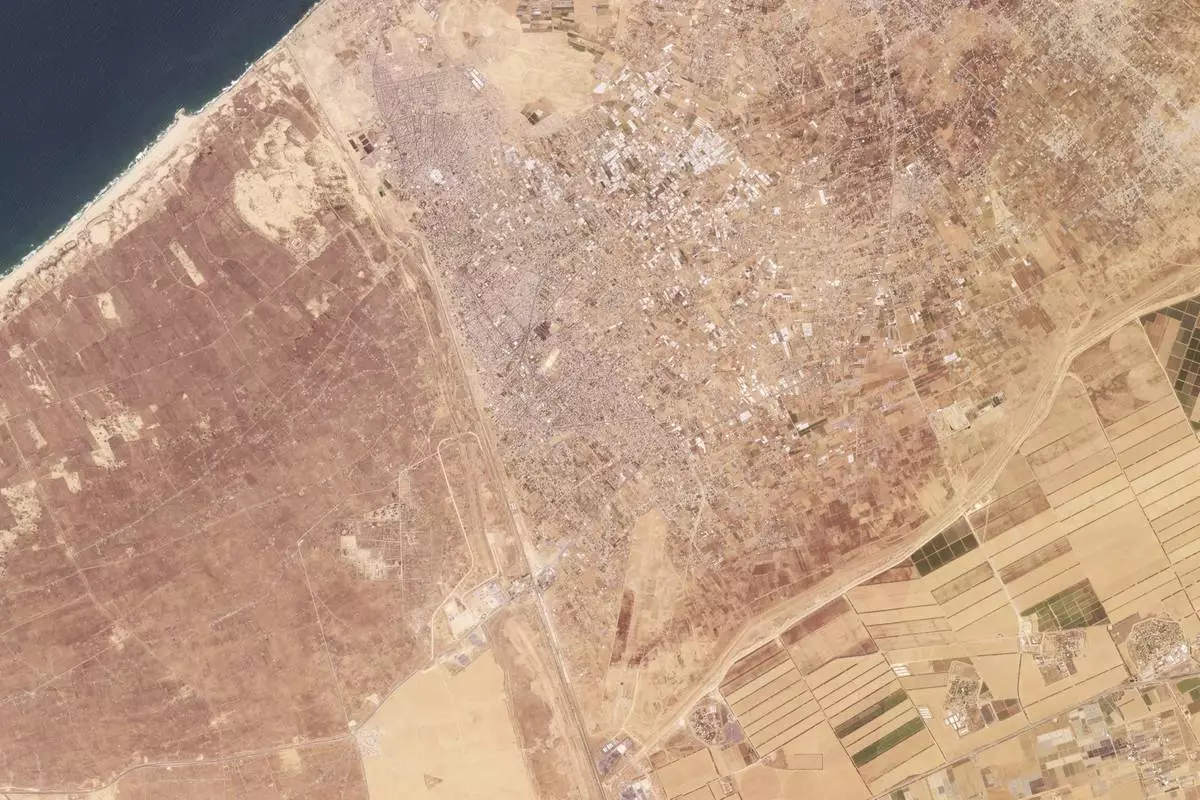
This satellite image taken by Planet Labs PBC shows Rafah in the Gaza Strip, center, Saturday, May 4, 2024. The Israeli army ordered some 100,000 Palestinians on Monday, May 6, 2024, to begin evacuating from the southern city of Rafah in Gaza, signaling that a long-promised ground invasion there could be imminent and further complicating efforts to broker a cease-fire. In the image, Egypt can be seen to the left, Israel to the bottom right corner. (Planet Labs PBC via AP)
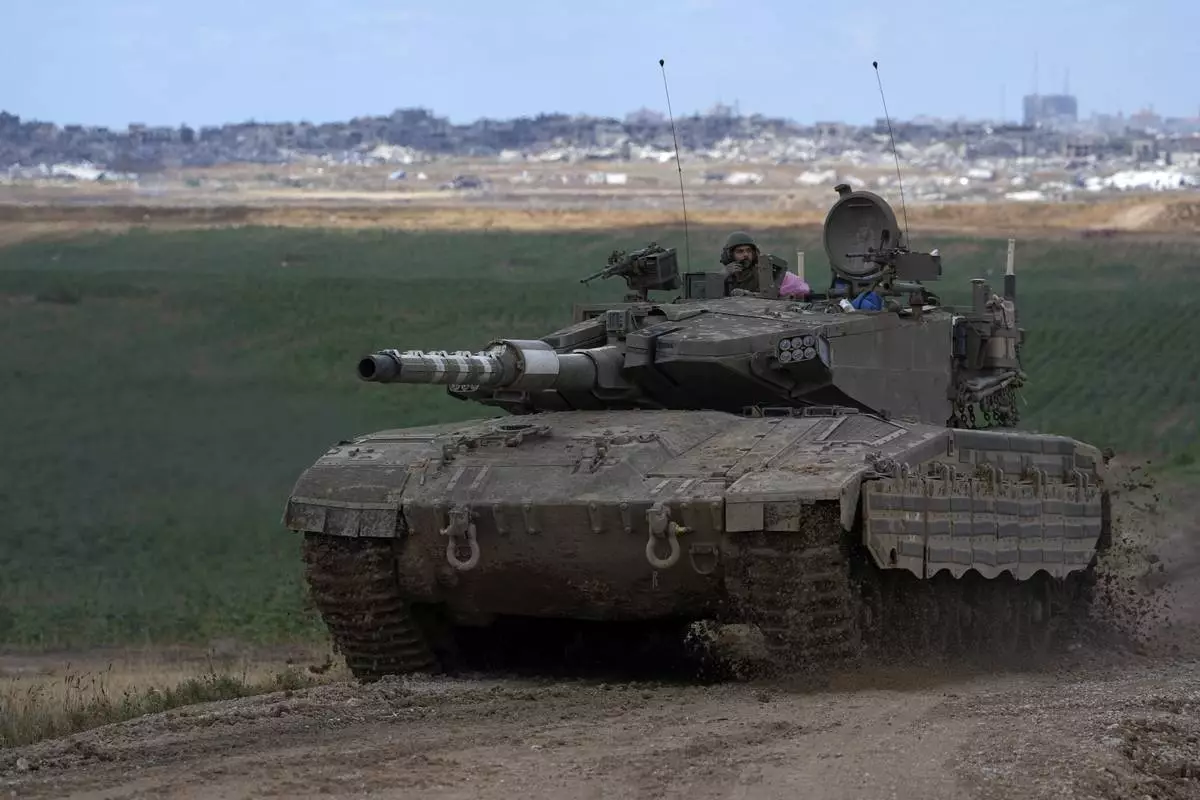
An Israeli Defense Forces tank drives away from the Gaza Strip, as seen from southern Israel, Monday, May 6, 2024. (AP Photo/Tsafrir Abayov)
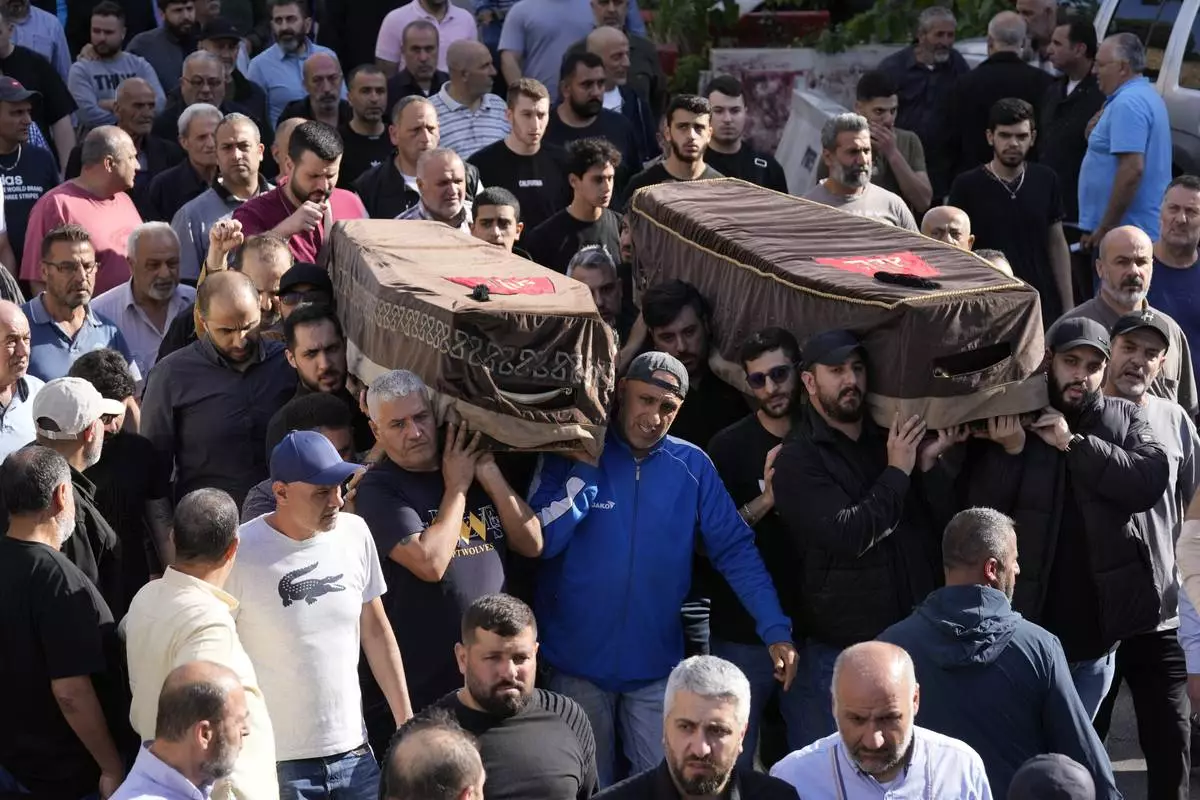
Mourners carry the coffins of two victims who were among four civilians from the same family that killed on Sunday by Israeli strikes on the southern town of Mays al-Jabal, during their funeral procession, in Beirut, Monday, May 6, 2024. Hezbollah militants and Israeli forces have been exchanging fire in south Lebanon since a day after the Israel-Hamas war began on Oct. 7. (AP Photo/Hussein Malla)
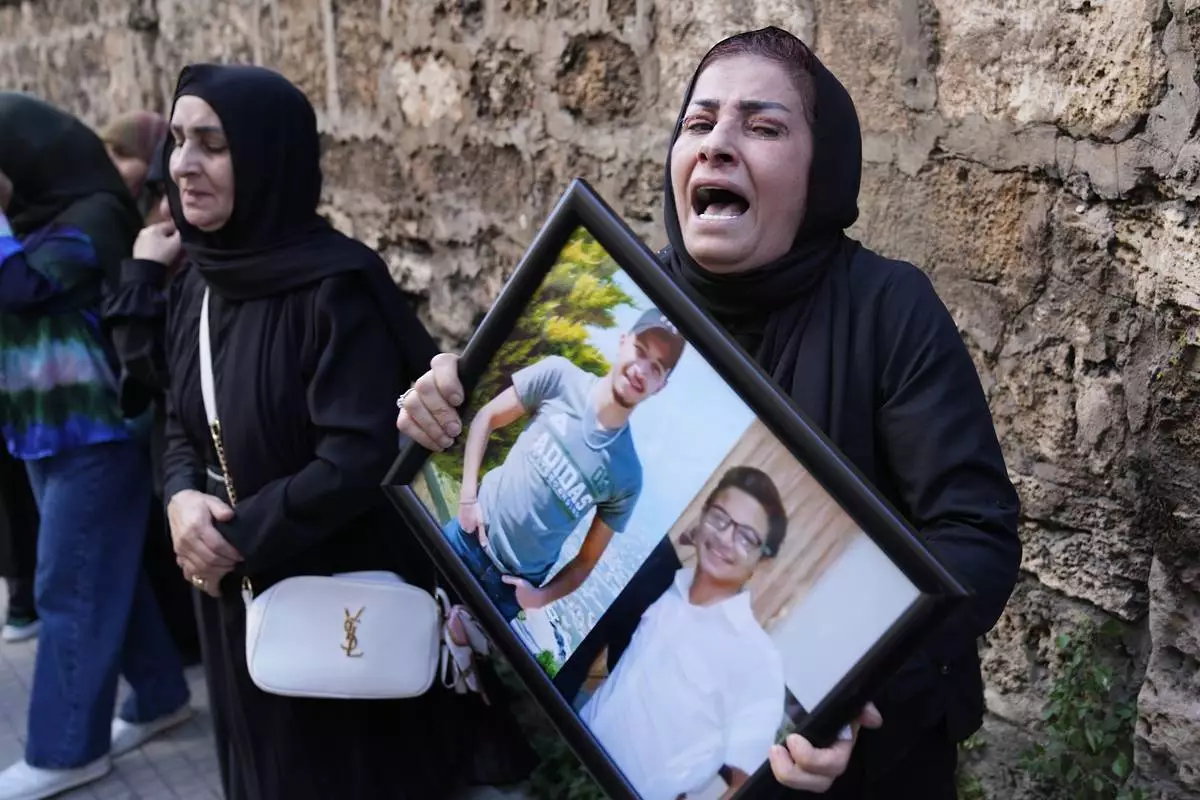
A Lebanese woman mourns, as she holds a frame with the portraits of two victims who were among four civilians from the same family that killed on Sunday by Israeli strikes on the southern town of Mays al-Jabal, during their funeral procession, in Beirut, Monday, May 6, 2024. Hezbollah militants and Israeli forces have been exchanging fire in south Lebanon since a day after the Israel-Hamas war began on Oct. 7. (AP Photo/Hussein Malla)

People attend a ceremony at the former Nazi German death camp of Auschwitz-Birkenau during the annual Holocaust remembrance event, the "March of the Living" in memory of the six million Holocaust victims in Oswiecim, Poland, Monday, May 6, 2024. The event comes amid the dramatic backdrop of the violence of the Israel-Hamas war after the Oct. 7 Hamas attack, the deadliest violence against Jews since the Holocaust, and as pro-Palestinian protests sweep U.S. campuses. (AP Photo/Czarek Sokolowski)
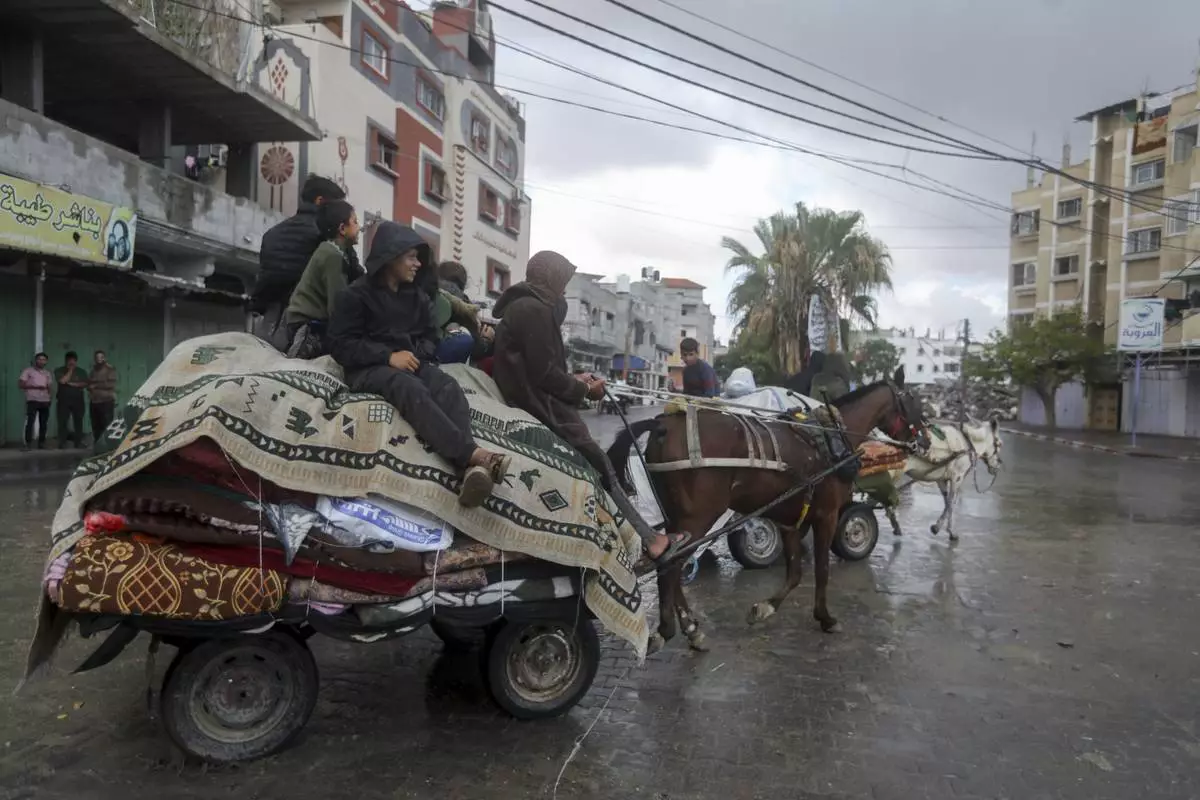
Palestinians flee from the eastern side of the southern Gaza city of Rafah after the Israeli army orders them to evacuate ahead of a military operation, in Rafah, Gaza Strip, Monday, May 6, 2024. The order affects tens of thousands of people and could signal a broader invasion of Rafah, which Israel has identified as Hamas' last major stronghold after seven months of war. (AP Photo/Ismael Abu Dayyah)
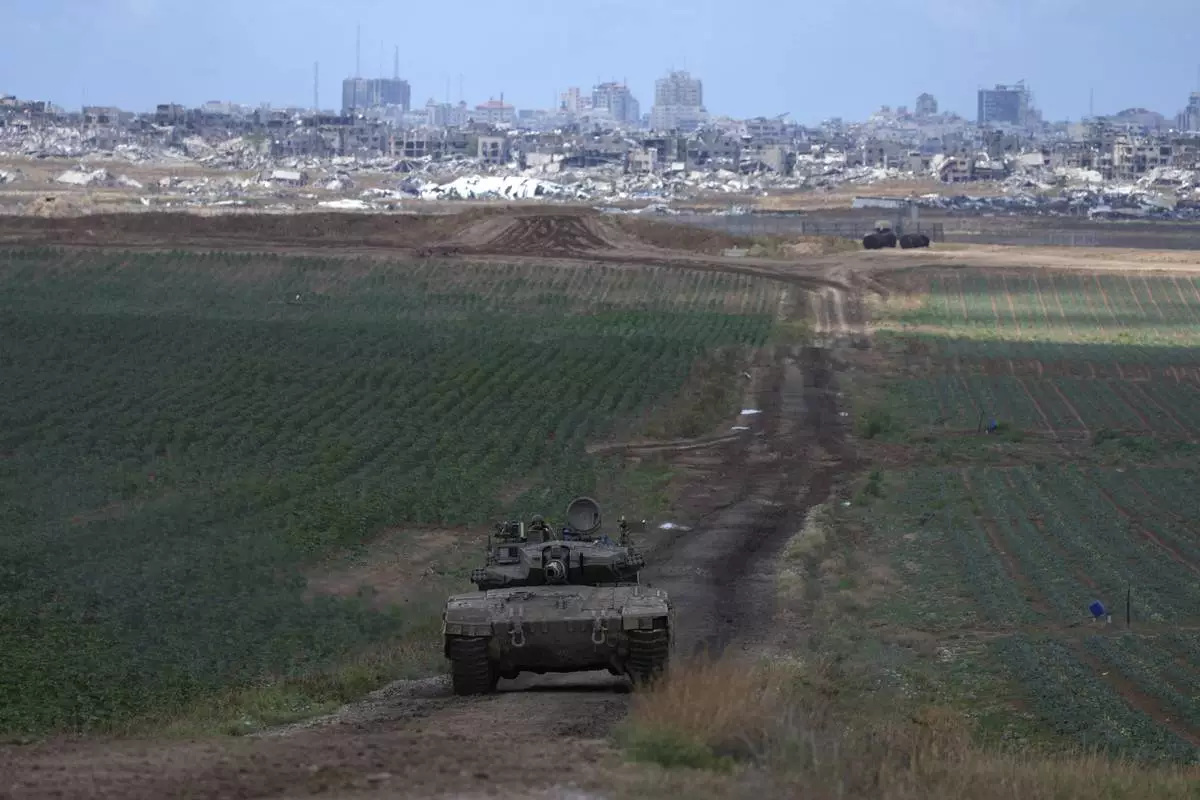
An Israeli Defense Forces tank drives away from the Gaza Strip, as seen from southern Israel, Monday, May 6, 2024. (AP Photo/Tsafrir Abayov)
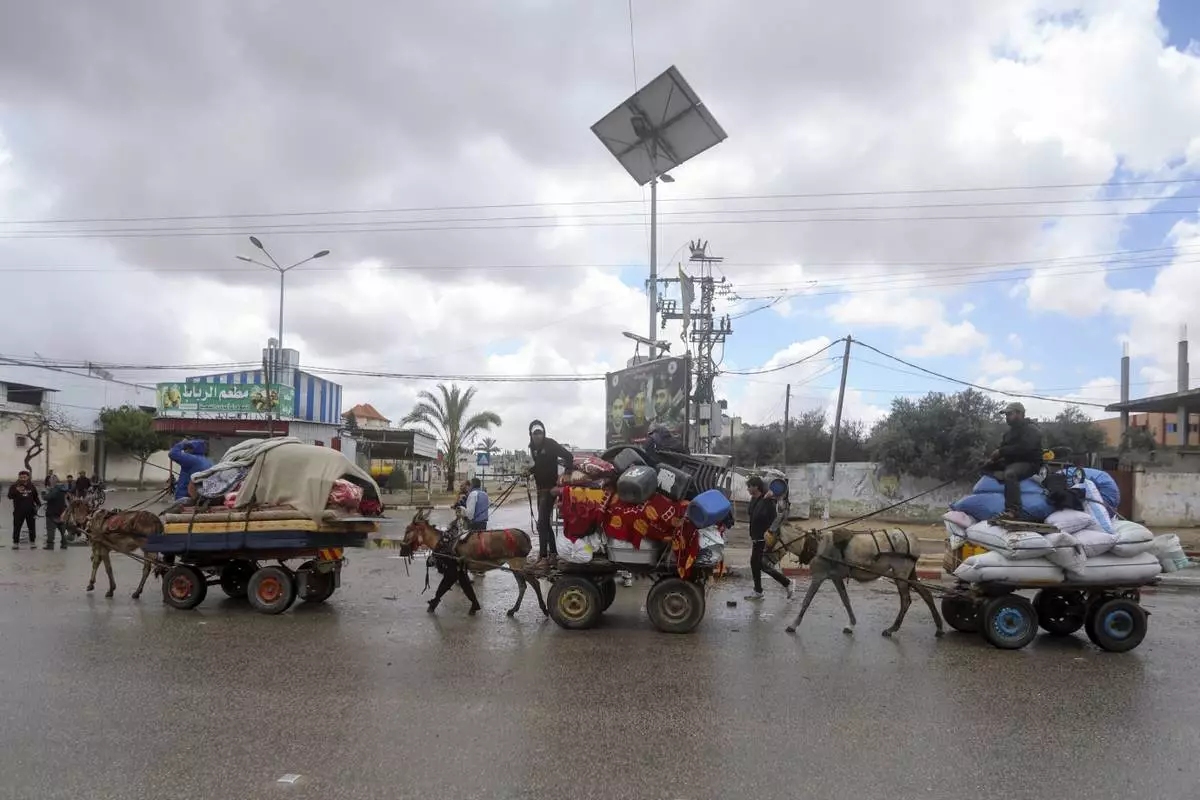
Palestinians flee from the eastern side of the southern Gaza city of Rafah after the Israeli army orders them to evacuate ahead of a military operation, in Rafah, Gaza Strip, Monday, May 6, 2024. The order affects tens of thousands of people and could signal a broader invasion of Rafah, which Israel has identified as Hamas' last major stronghold after seven months of war. (AP Photo/Ismael Abu Dayyah)
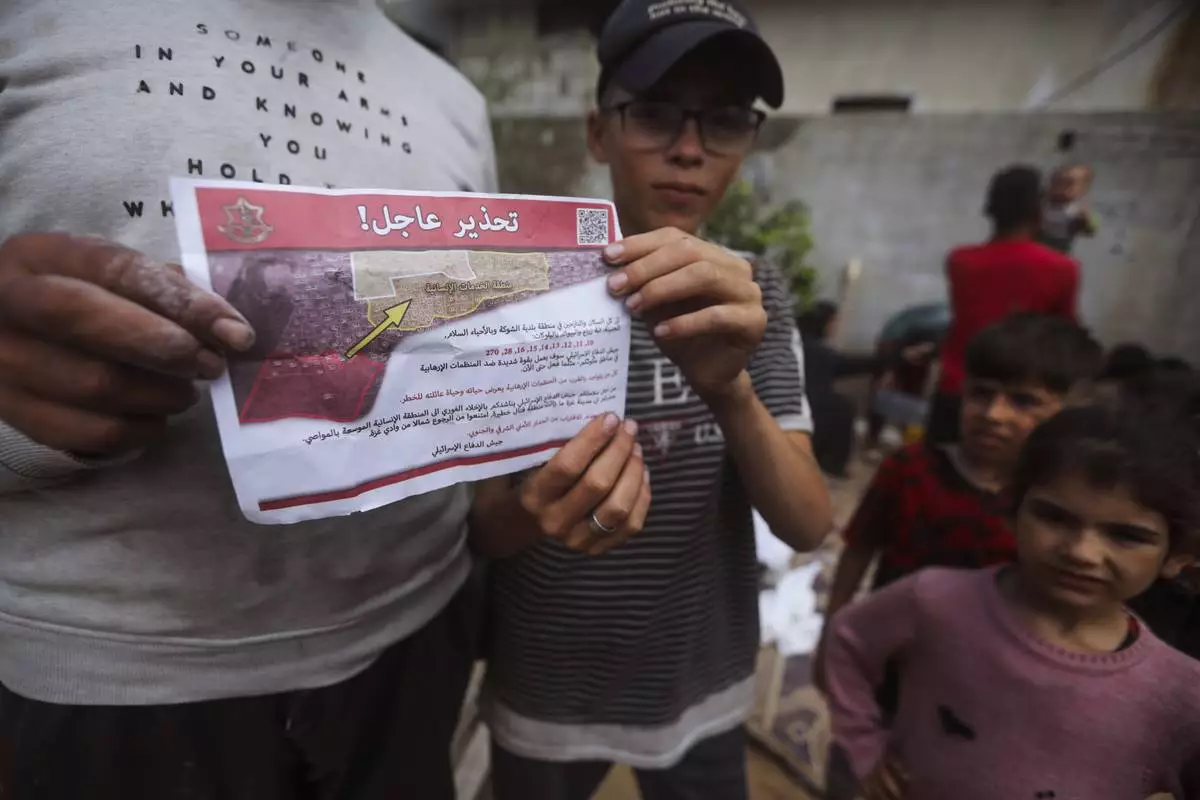
Palestinians hold leaflets dropped by Israeli planes calling on them to evacuate ahead of an Israeli military operation in Rafah, southern Gaza Strip, Monday, May 6, 2024. The order affects tens of thousands of people and could signal a broader invasion of Rafah, which Israel has identified as Hamas' last major stronghold after seven months of war. (AP Photo/Ismael Abu Dayyah)
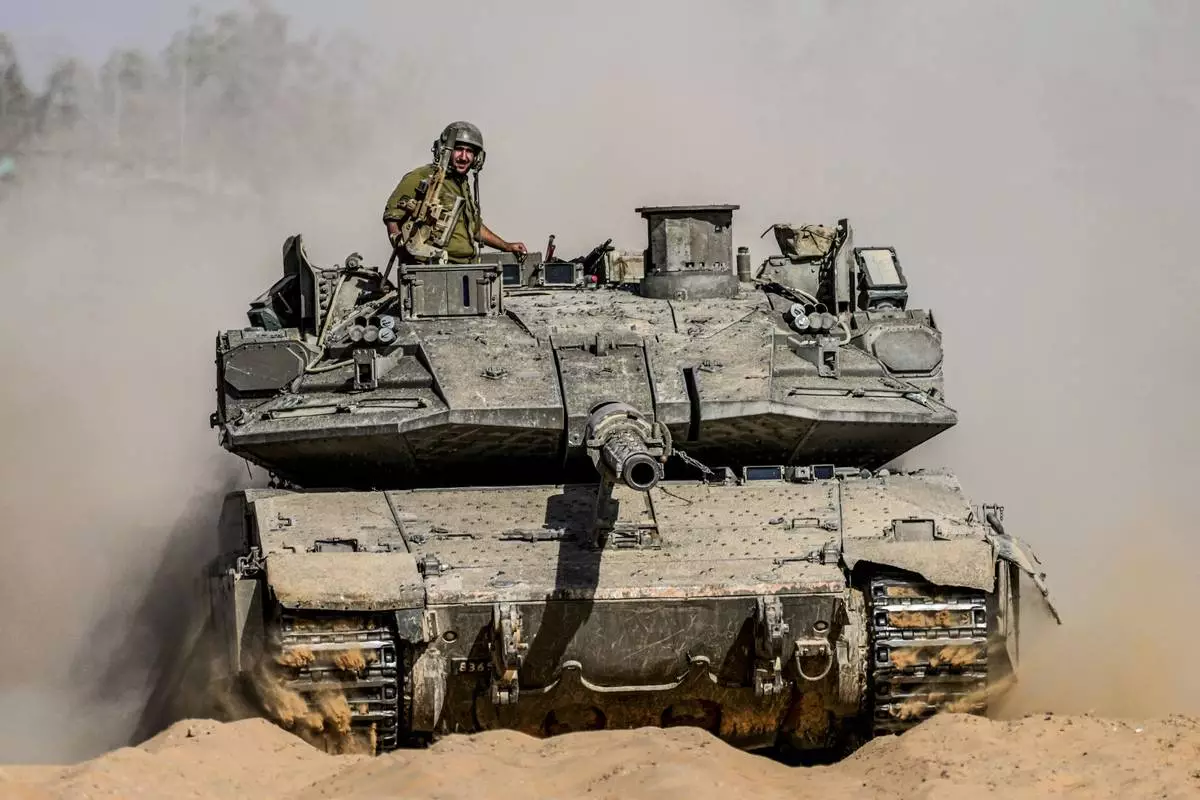
Israeli soldiers drive a tank at a staging ground near the border with the Gaza Strip, in southern Israel, Sunday, May 5, 2024. (AP Photo/Tsafrir Abayov)
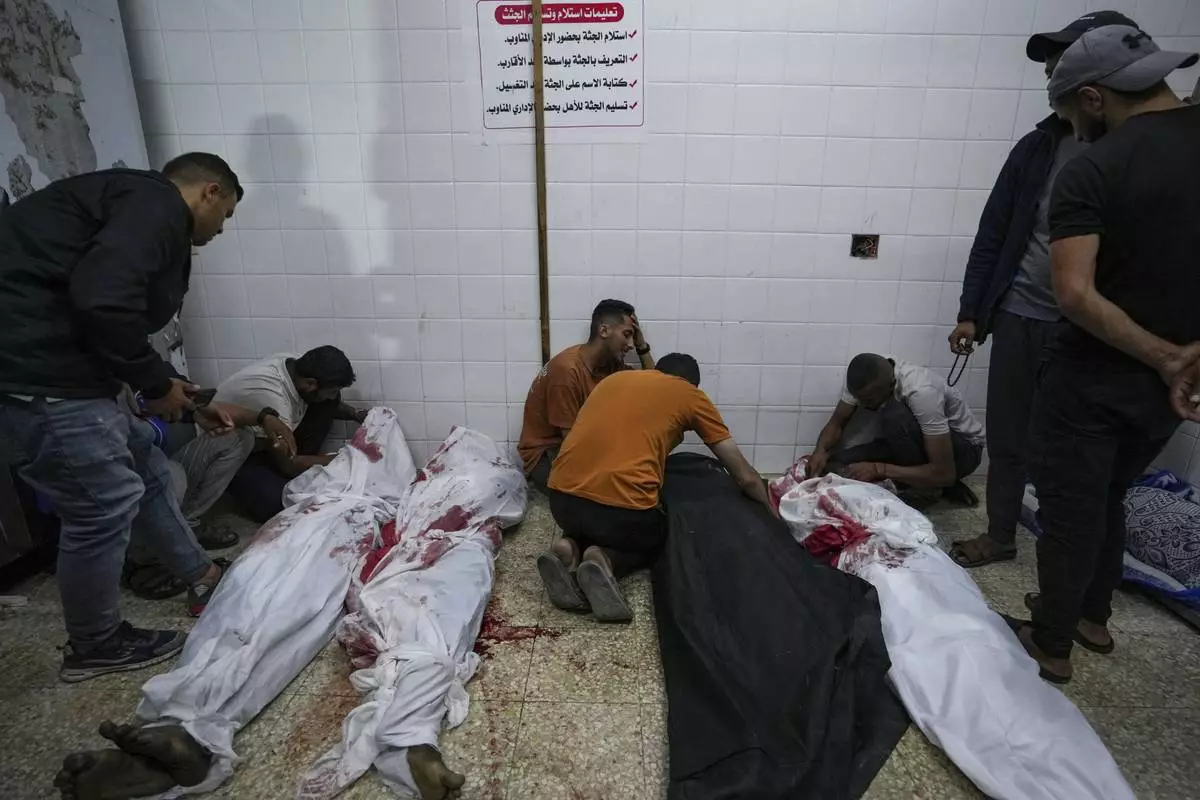
Palestinians react next to the bodies of their relatives who were killed in an Israeli airstrike in Gaza Stirp, at the Al Aqsa hospital in Deir al Balah, Gaza, Sunday, May 5, 2024. (AP Photo/Abdel Kareem Hana)
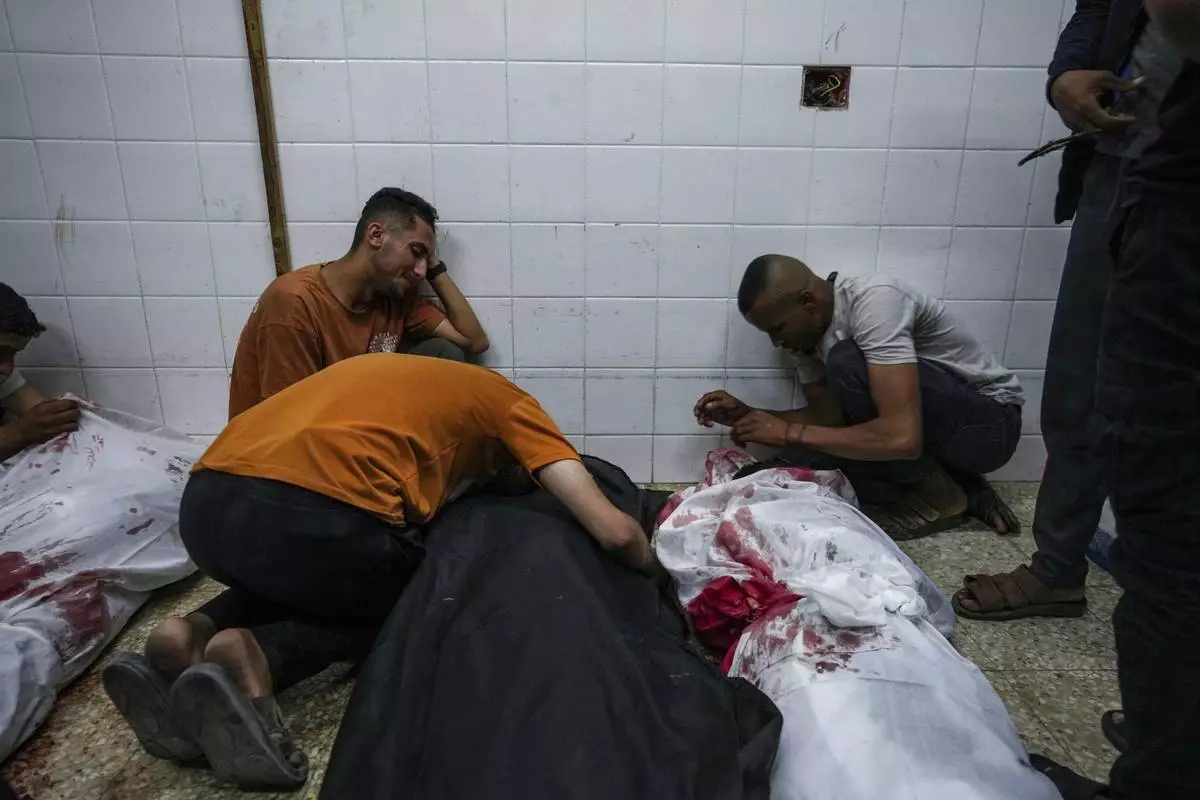
Palestinians react next to the bodies of their relatives who were killed in an Israeli airstrike in Gaza Stirp, at the Al Aqsa hospital in Deir al Balah, Gaza, Sunday, May 5, 2024. (AP Photo/Abdel Kareem Hana)
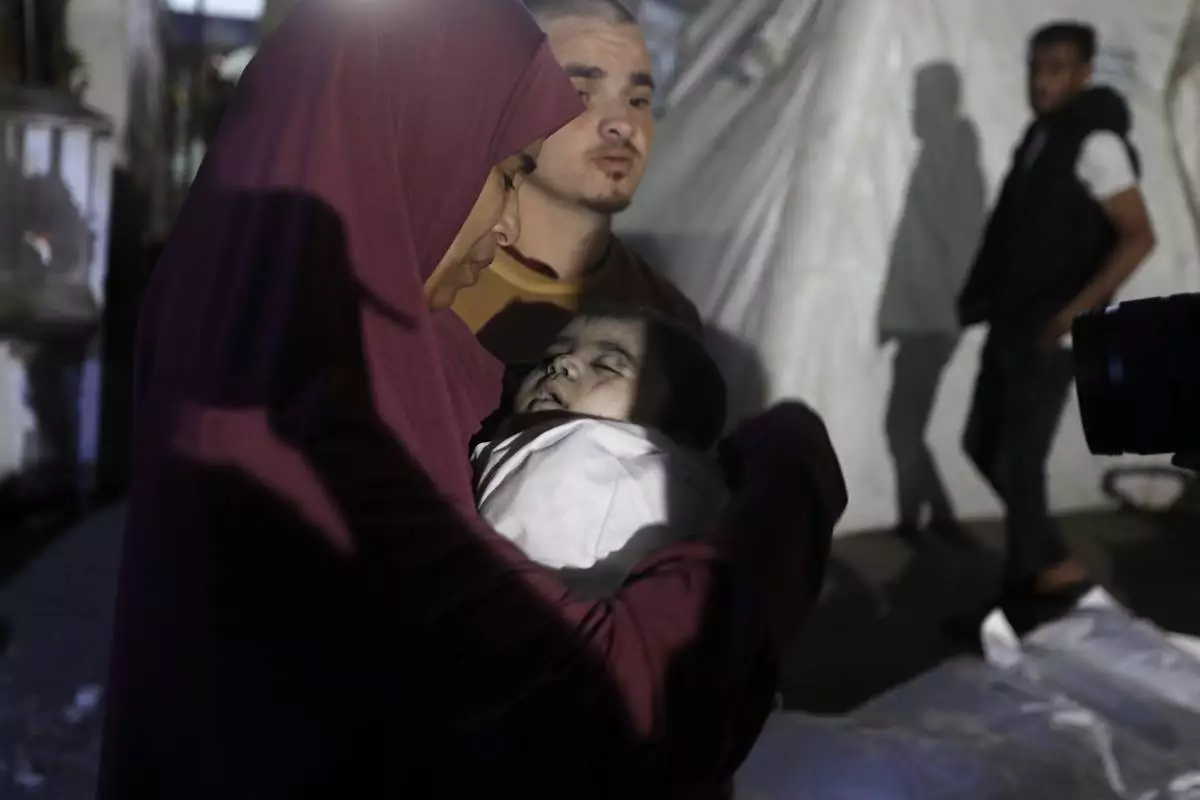
A Palestinian woman mourns her relative, 7-month old baby Hani Qeshta, who was killed in an Israeli bombardment on a residential building with Qeshta's family, at the morgue of Al Najjar hospital in Rafah, southern Gaza Strip, Sunday, May 5, 2024. (AP Photo/Ismael Abu Dayyah)
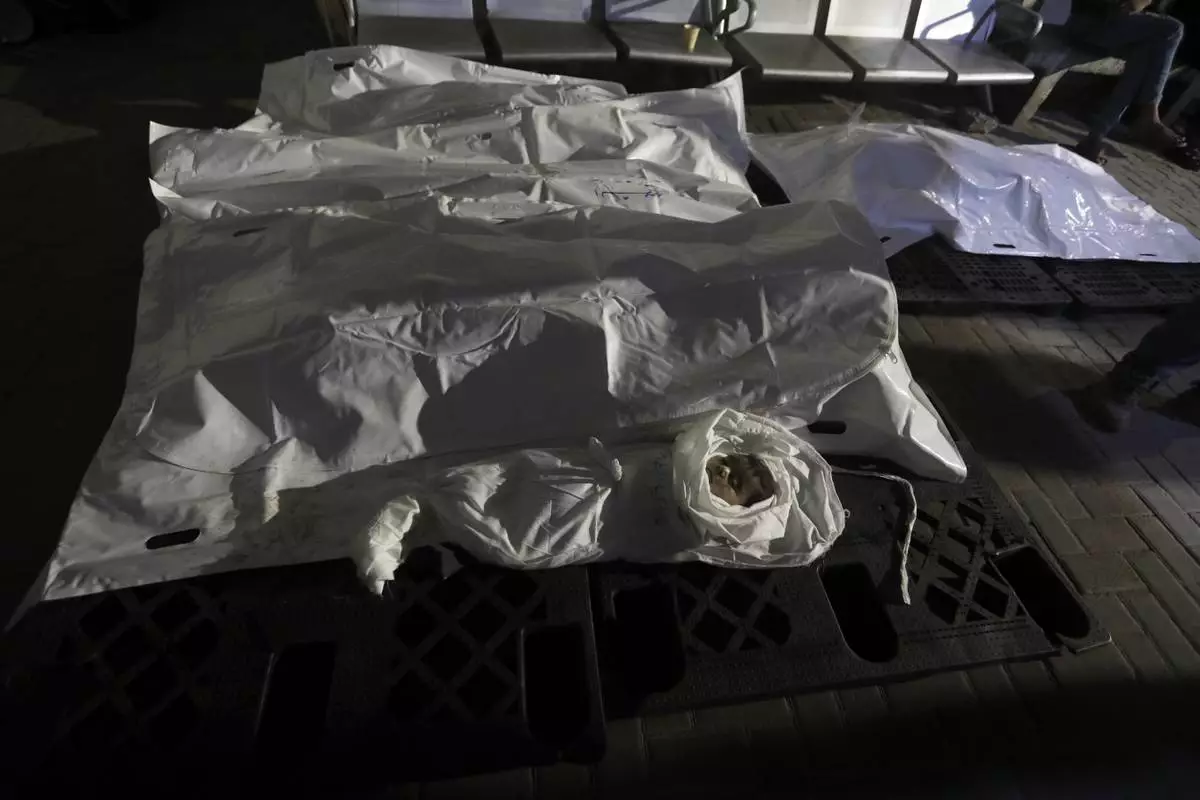
The Qeshta family is seen in body bags at the morgue of Al Najjar hospital in Rafah, southern Gaza Strip, Sunday, May 5, 2024. The family was killed in an Israeli bombardment on a residential building in Rafah. (AP Photo/Ismael Abu Dayyah)
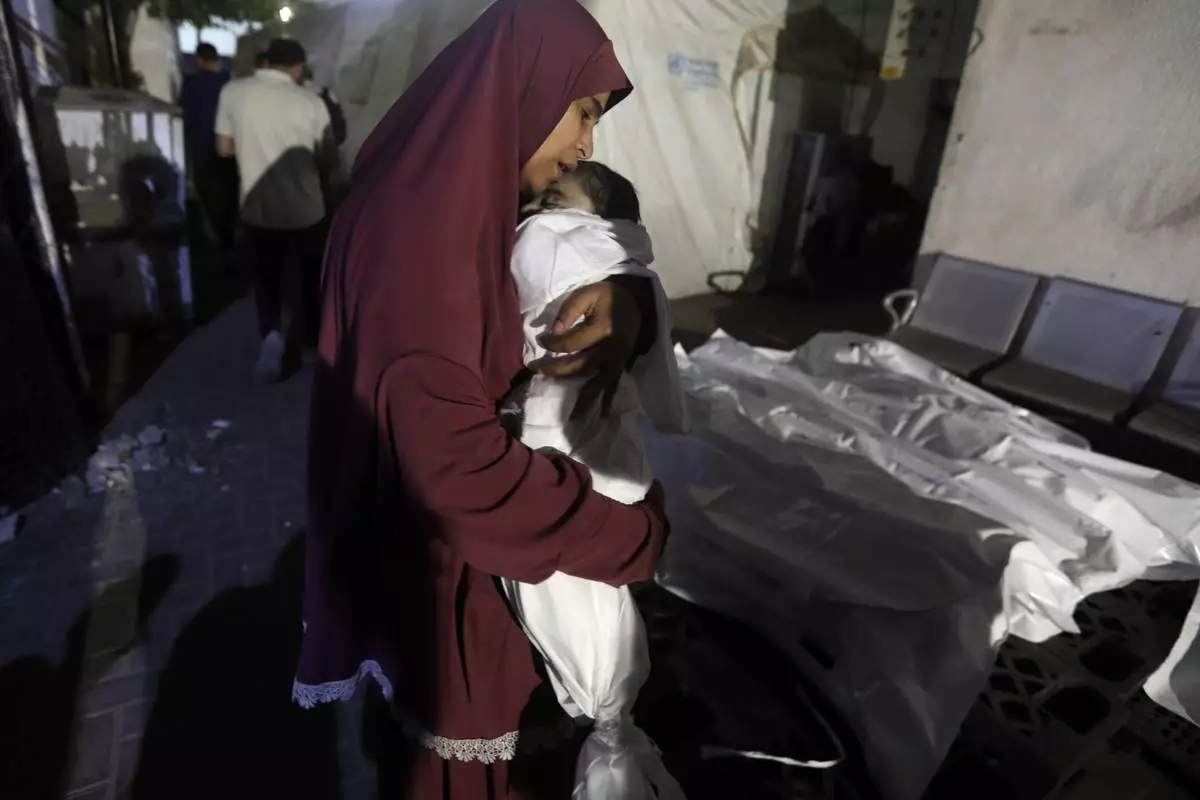
A Palestinian woman mourns her relative, 7-month old baby Hani Qeshta, who was killed in an Israeli bombardment on a residential building with Qeshta's family, at the morgue of Al Najjar hospital in Rafah, southern Gaza Strip, Sunday, May 5, 2024. (AP Photo/Ismael Abu Dayyah)






















